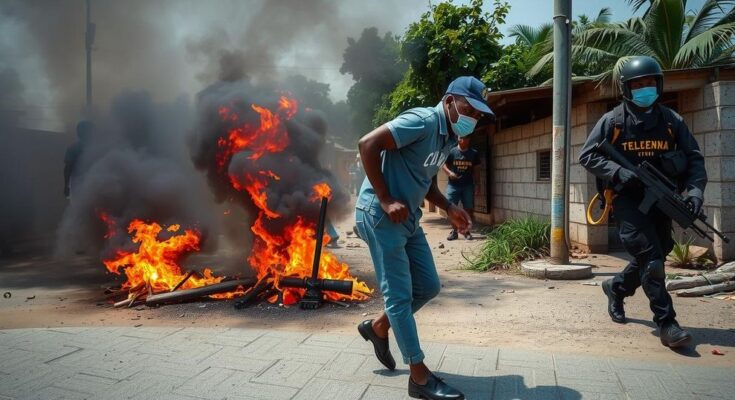Since Monday, Mozambique has seen at least 21 deaths linked to political unrest following controversial election results. Opposition leader Vanancio Mondlane contests the legitimacy of the elections favoring Frelimo Party incumbent Daniel Chapo, and plans to declare himself president on January 15. Protests have resulted in over 70 arrests, with human rights concerns raised regarding police actions against demonstrators. The U.S. and other observers call for accountability and peaceful resolution.
As Mozambique grapples with escalating political unrest, at least 21 individuals have lost their lives amid violent clashes between law enforcement and protestors following the controversial October elections. Vanancio Mondlane, the leader of the opposition against the Frelimo Party—which has dominated Mozambique’s political landscape for nearly five decades—has vowed to self-proclaim the presidency despite his electoral defeat. The situation has led to significant unrest, with over 70 arrests and additional fatalities reported since the start of the unrest earlier this week.
The Mozambican Constitutional Council declared Frelimo Party’s candidate, Daniel Chapo, as the victor of the October 9 elections, with results indicating a 65.2% to 24% margin over Mondlane. This announcement ignited protests from Mondlane’s camp, who allege that the elections were marred by irregularities and lacked transparency. In response to the unrest, Mondlane announced plans to declare himself president on January 15, coinciding with Chapo’s scheduled inauguration, while urging his followers to avoid violence despite the turbulent environment.
Human rights groups have expressed concerns about the conduct of Mozambique’s security forces during the protests, alleging that police have exercised excessive force. According to police commander Bernadino Rafael, law enforcement has acted primarily in defense of themselves against protestor attacks. U.S. officials echoed these concerns, citing significant irregularities in the election process, and named the importance of accountability for human rights violations. The international community, including the United States, has called for peaceful dialogue among all parties involved to mend the social fabric of Mozambique and promote stability.
The political landscape in Mozambique is historically dominated by the Frelimo Party, which has held power since the country gained independence from Portugal in 1975. The recent elections on October 9 saw widespread allegations of electoral fraud and irregularities, culminating in protests led by the opposition, particularly by Vanancio Mondlane of the Mozambique Political Movement. The political tension has escalated into violence, resulting in numerous casualties and highlighting the longstanding dissatisfaction among segments of the populace regarding governance and election integrity. The backdrop of profound social discontent further complicates the situation, with various local and international entities calling for transparency and reform in Mozambique’s electoral processes.
In summary, Mozambique is currently facing a volatile political crisis following contested election results that have led to violence and loss of life. Vanancio Mondlane’s reaction to the elections reflects widespread discontent among his supporters regarding the legitimacy of the electoral process. As international observers call for accountability and a peaceful resolution, the situation remains precarious, underscoring the urgent need for dialogue to ensure stability and uphold democratic principles within the nation.
Original Source: www.upi.com




